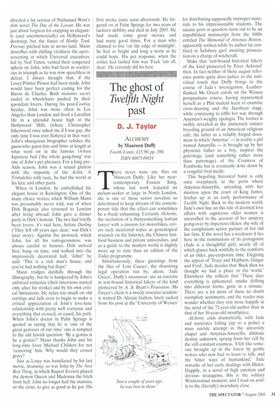The ghost of Twelfth Night past
D. J. Taylor
ALCHEMY by Maureen Duffy Fourth Estate, £15.99, pp. 380, ISBN 0007149654 There never were any flies on Maureen Duffy. Like her nearcontemporary Francis King, whose last work featured an asylum-seeker at large in North London, she is one of those senior novelists so determined to keep abreast of the contemporary tide that the effect can sometimes be a shade exhausting. Certainly Alchemy, the recitation of a thirtysomething lesbian lawyer with a passion for motorbikes, covers such incidental topics as genealogical research on the Internet, the Chinese fastfood business and private universities, and as a guide to the modern world is slightly more up to date than an edition of the Today programme.
Simultaneously, these gleanings from the files of 'Lost Causes', the shoestring legal operation run by, ahem, 'Jade Green', Duffy's raisonneur, are an exercise in text-bound historical fakery of the kind pioneered by A .S. Byatt's Possession. Ms Green's client is a tweely oracular academic named Dr Alistair Galton, lately sacked from his post at the 'University of Wessex' for distributing supposedly improper materials to his impressionable students. The satanic porn in question turns out to be an unpublished manuscript from the 1600s entitled The Memorial of Amyntas Boston, apparently written while its author lay confined in Salisbury gaol awaiting prosecution on a charge of witchcraft.
Make that 'text-bound historical fakery of the kind pioneered by Peter Ackroyd' then. In fact neither of these august reference points quite does justice to the individual touch that Duffy brings to the course of Jade's investigation. Leatherflanked Ms Green enrols on the Wessex postgraduate course, having represented herself as a Phd student keen to examine cross-dressing and the Jacobean stage, while continuing to riffle her way through Amyntas's weighty apologia. The former is swiftly revealed as the immensely sinister breeding ground of an American religious cult; the latter as a reliably forged document in which `Amyntas' — in reality a girl named Amaryllis — is brought up by her physician father as a boy, inspires the patronage (and something rather more than patronage) of the Countess of Pembroke but is eventually done down by a vengeful rival medic.
This beguiling historical hand is only once overplayed, at the point where Amyntas/Amaryllis, attending with her mistress upon the court of King James, fetches up at an early performance of Twelfth Night. Back in the modern world, Jade's own line on this tale of doomed love affairs with capricious older women is unravelled in the account of her amatory going-over by imperious Helen, the wife of the complaisant senior partner of her old law firm. If the novel has a weakness it lies here in the ruminations of its protagonist (Jade is a thoughtful girl), nearly all of which glance back wistfully to the comforts of an older, pre-corporate time. Elegising the appeal of 'Tracy and Hepburn, Ginger and Fred', Jade decides that 'Back then we thought we had a place in the world.' Elsewhere she reflects that 'These days everything is ephemeral, smoke drifting into different forms, gone in a minute.' There are a lot more of these no doubt exemplary sentiments, and the reader may wonder whether they rest more happily in the mind of the 72-year-old author than in that of her 36-year-old mouthpiece.
Alchemy ends dramatically, with Jade and associates foiling (up to a point) a mass suicide attempt in the university chapel and Amyntas/Amaryllis, ultimate destiny unknown, sprung from her cell by the still constant countess. 'I felt like someone brought up in the forest by gentle wolves who now had to learn to talk, and the bitter ways of humankind,' Jade remarks of her early dealings with Helen. Happily, in a novel of high emotion and devious stratagems, this is the solitary Wintersonian moment, and I read on avidly to the (literally) incendiary close.


























































 Previous page
Previous page